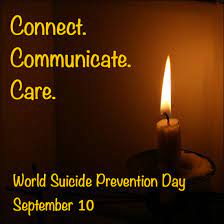World Suicide Prevention Day

World Suicide Prevention Day 2017 has come and gone for another year and hopefully some lives will have been saved. This doesn’t mean the issue has gone away for another year, far from it. It is with us every day and takes a huge toll on countless families particularly when you take into account attempted suicides. Death by suicide is a tragic event, that the person felt so alone and unable to talk to anyone and seek help and support. The impact of such a death has far-reaching consequences for family, friends and colleagues who are left to wonder why and ask themselves the what if’s and invariably do not get the answers they so desperately need.
Mental illness, is a challenging enough subject to talk about particularly with someone suffering with some form of illness. So, imagine how much more challenging it can be to ask a person if they have suicidal thoughts and strike up a conversation. It is difficult; however, it need not be as difficult as we think it is or sometimes make it.
In my experience, when the sufferer admits suicidal thoughts or some form of mental illness, they make it easier to help by the way in which they open up and talk. Be there to listen. Be supportive, caring and empathetic.
Avoiding asking someone about suicide or indeed other mental illness can be because we are uncomfortable with the subject, or worry that we do not have the skills to help.
Asking someone are they suicidal, is not going to cause them to become suicidal – the thoughts are already there. There are some tips that may make helping a suicidal person come back from the brink if that is the situation they find them in.
· Talk calmly, slowly and with simple language.
· Do not be afraid to use words like “suicide” and “death”
· Avoid phrases like “I know how you must be feeling” or “Everything will work out fine”
· Avoid giving false hope or making promises
· Ask them to talk about their feelings and what they are thinking
· Find out what has caused the suicidal thoughts and try to counter this with reasons for living
· Don’t patronise or make them feel guilty about the situation they are in.
· Ask questions and get them to do the talking
These prompts can also work before it reaches the situation whereby the person is found in the act of taking their own life.
I would strongly recommend that organisations invest in mental health first aid training for staff. In my opinion, no particular skills are required, just a simple desire to help someone in need.
